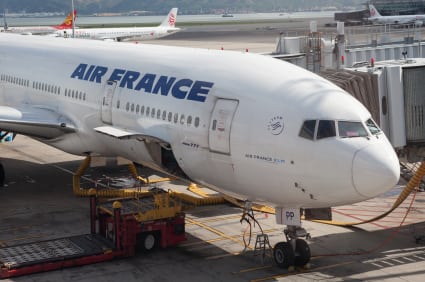 |
For the passengers on Air France Flight 562, an emergency layover in war-torn Syria was only half of what made the flight a rare experience. Things really got interesting when the crew asked passengers to open their wallets to check if they had enough cash to pay for fuel when the plane, heading from Paris to Lebanon's capital, was diverted amid tensions on the ground near the Beirut airport on Aug. 15, instead landing in Damascus, Syria.
Reuters reported that Damascus airport authorities said they could not accept a credit card payment and would only take cash. "As a precaution and in anticipation, the crew asked how much money the passengers had in cash to pay to fill up with fuel," an Air France spokeswoman said, according to Reuters. She said the airline was eventually able to pay the bill without taking money from passengers, but she declined to say how it had paid or how much the fuel stop cost.
From the beginning, the layover was serious business for Air France, the flagship carrier for a country whose government warns all its citizens to avoid or leave Syrian soil, and the airline suspended its regular flights to Damascus earlier this year, according to AP. However, the situation seemed perfect for funny one-liners online, as tweets ranged from, "This is your captain panhandling: Air France pilot asks passengers to chip in for fuel after landing in Syria" from New York Times editor Jim Roberts, to "Just imagine, you run out of fuel—in Syria: Air France flight stuck in Damascus asks passengers for gas money," from the AP.
So at first glance, the situation might have been a chance for Air France to poke some fun at itself. Instead the airline chose to stay mum and not release an official statement. Nor was there a Facebook post or a single tweet about it. But considering the level of international diplomacy involved, Air France held back on a response, and rightfully so, as it's since come under fire from the French government for making the landing in Syria, as it was a big security risk. "In the plane, there were people from Lebanon who are wanted by the Syrian regime," said French Foreign Minister Laurent Fabius, as reported by The Wall Street Journal.
If nothing else, the situation highlights two PR lessons: First, in a time when organizations feel pressured to issue a statement in a crisis, Air France was measured in its response—and for good reason. And second, a crisis plan is a living document and should be treated as such. Even the most unlikely scenarios should be covered. So perhaps from now on flight will carry cash instead of just plastic.
Follow Bill Miltenberg: @bmiltenberg
